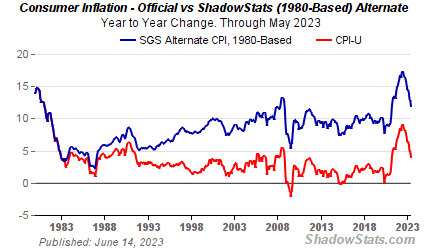Along that line, economist John Williams has an entire service devoted to alternate measures of economic data; it's called Shadow Government Statistics, or ShadowStats. On the homepage, Williams has a graph of U.S. inflation using the pre-Clinton (pre-adjustments) CPI measures. The graph shows inflation's pre-crisis low as slightly less than 4%, in 2002, and a high of 9% in early 2008. Currently, the pre-Clinton CPI measure has inflation at around 5%. The same measure shows the crisis low at about +1%. Had the old CPI still been used, there wouldn't have been any reported deflation at all.
From a stable-prices perspective, Williams' proprietary SGS Alternate measure is worse. It shows the U.S. enduring double-digit inflation in early 2008, and a crisis low that never got below +5%:

Saying that the U.S. government is cooking the inflation books makes a contentious claim, to be sure. What side you're on depends upon how venal - or desperate - you think U.S. government financial officials are. The benefits to the U.S. government from down-decking the inflation numbers are threefold: a) lower cost-of-living payment adjustments on inflation-adjusted transfer payments like Social Security, plus lower COLAs in general; b) lower tax-bracket adjustments; and... c) lower rates on Treasury securities, as lower inflation numbers make a specified nominal rate imply a higher real rate. Lower inflation numbers mean a lower inflation premium.
I should say that the same threefold benefits apply to not overstating inflation, too. Needless to say, the U.S. government and those who see the inflation picture the government's way believe that the new inflation numbers are more accurate than the old. The benefit to the government, in their eyes, is eliminating overpayments and too-low tax collections.
![[Most Recent Quotes from www.kitco.com]](http://www.kitconet.com/charts/metals/gold/tny_au_en_usoz_2.gif)

No comments:
Post a Comment